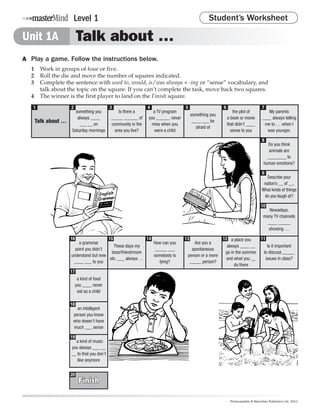
M m1 resource_activity_unit_1a
- 1. Photocopiable © Macmillan Publishers Ltd. 2011 Unit 1A Student’s WorksheetLevel 1 Talk about … A Play a game. Follow the instructions below. 1 Work in groups of four or five. 2 Roll the die and move the number of squares indicated. 3 Complete the sentence with used to, would, is/was always + -ing or “sense” vocabulary, and talk about the topic on the square. If you can’t complete the task, move back two squares. 4 The winner is the first player to land on the Finish square. Talk about … something you always ____ ___ __ on Saturday mornings Is there a _____ ______ of community in the area you live? a TV program you ______ never miss when you were a child something you ____ ___ be afraid of the plot of a book or movie that didn’t ____ sense to you My parents ____ always telling me to … when I was younger. Do you think animals are ________ to human emotions? Describe your nation’s __ of __. What kinds of things do you laugh at? Nowadays, many TV channels ____ _____ showing … a grammar point you didn’t understand but now ____ ___ to you These days my boss/friend/mom etc. ___ always … How can you _____ ___ somebody is lying? Are you a spontaneous person or a more _____ person? a place you always ____ __ go in the summer and what you __ do there Is it important to discuss _____ issues in class? a kind of food you ____ never eat as a child an intelligent person you know who doesn’t have much ___ sense a kind of music you always ___ __ __ to that you don’t like anymore Finish 1 2 3 4 5 6 7 8 9 10 111213141516 17 18 19 20
- 2. Teacher’s NotesTeacher’s NotesUnit 1ALevel 1 Written by Leanne Gray Design: Jordan Publishing Design Limited Illustration: Mike Lacey Photocopiable © Macmillan Publishers Ltd. 2011 Objective: to practice talking about habits and use “sense” vocabulary Time: 30–45 minutes Skills: speaking and listening—talking about habits, past and present Vocabulary: sense Grammar: would, used to, and (be) always + –ing Preparation: hand out one copy per group of four–five; bring in enough dice and counters for each team Talk about … Lead-in» Draw a circle on the board and write SENSE inside.Ask the students to call out any of the phrases they remember from Student’s Book page 8.Write their answers around the circle. Alternatively, ask students to come up to the board and write them. Next, write the following sentences on the board: I always ______ ___ laugh at [T’s choice] on TV when I was younger, but now I don’t find it funny. My sense of ______ has completely changed. When I was little, the children in my area _____ always play together on the street.There was such a _____ ______ ___ community. Ask the students what is missing. Elaborate a little on the sentences, e.g., why you don’t think the TV show is funny anymore, what kinds of games you would play on the street, etc.Then ask the students to work in pairs for a few minutes to discuss the sentences and whether or not they are true for them. Elicit examples from one or two confident students. ●● Put the students into groups of four or five and hand out a copy of the game board and enough dice and counters for each group. The aim of this communicative game is to reach the Finish square first. Pre-teach spontaneous by asking students Which adjective describes someone who does things in a natural, sudden way without any planning? ●● Have the students read the directions. Elicit the rules from volunteers, in order to check they understand. (Players roll the die and move along the board. When they land on a square, they say what the missing words are. Other students in the group act as referees. If they decide the player has completed the phrase/ sentence correctly, that player writes in the answer and follows up by sharing some relevant information. If the sentence is incorrect, the player must go back two squares.) ●● Point out that if another player lands on a square that is already complete, they should simply talk about the prompt. ●● Have the students start the game with the student who rolled the highest number going first, and then the player to their left taking the following turn, and so on. ●● Monitor while the students are playing, and give help if needed. Make notes of any errors with the target language and of any interesting sentences. ●● Have the groups continue playing until the first person reaches the Finish square. Answers 2 used to do 3 strong sense 4 would 5 used to 6 make 7 were 8 sensitive 9 sense, humor 10 are always 11 sensitive 12 used to, would 13 sensible 14 sense when/if 15 is, … –ing 16 makes sense 17 would 18 common 19 used to listen Follow-up ●● Ask each group to choose one square that they found particularly interesting. Put the students into new groups and have them tell each other what they discovered about their original group, e.g., Natalia used to be really afraid of water so she only learned to swim a few years ago! Web homework Have the students research one of the following topics from the game. Invite them to share any interesting findings in the next lesson. – how to sense when someone is lying – if animals are sensitive to human emotion – a plot of a movie/book that didn’t make sense – a place a classmate used to go in the summer
